Harmonization in IFRS rules and regulations - Amara Holdings case study
Added on 2023-06-10
25 Pages4830 Words435 Views
Amara HOlding
International Accounting
Harmonization in IFRS rules and regulations
Name of the Author
University Name-
International Accounting
Harmonization in IFRS rules and regulations
Name of the Author
University Name-
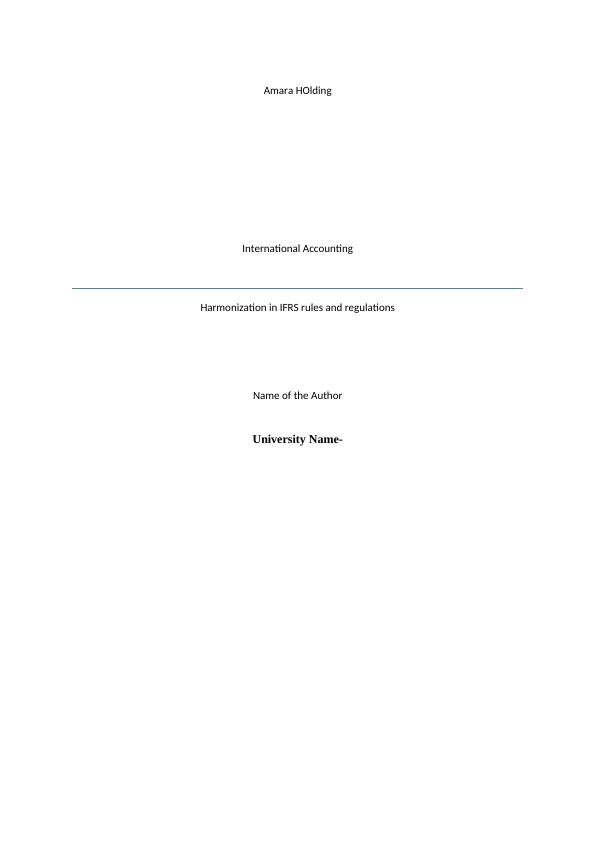
EXECUTIVE SUMMARY
With the increasing ramified economic changes, every organization needs to comply
with the domestic and international financial standards to mitigate the harmonization issues in
their international reporting frameworks. Current report under study deals with certain
discussions related to International Financial Reporting Standards (IFRS). The limelight topic
is the critical evaluation of the success of harmonisation in adoption of IFRS. The country
chosen for examination purpose is Singapore. For case study purposes, the company
illustrated is Amara Holdings Limited. The series in which report is presented involves the
reasons of harmonisation, issues involved, case study on Amara Holdings Limited depicting
the company’s financials consisting of equity, capitalization of development costs, effect of
deferred taxes, etc. Along with the case study involves, a statement pinpointing the basis of
research, and the issues involved. The report ends with certain conclusions and
recommendations. It is analysed that the main reason of harmonization is related to mitigate
the regulatory compliance issues related to domestic and international accounting standards.
THE adoption of IFRS was done with view to strengthen the transparency of the regulatory
compliance and accounting standard reporting framework of organization in long run.
With the increasing ramified economic changes, every organization needs to comply
with the domestic and international financial standards to mitigate the harmonization issues in
their international reporting frameworks. Current report under study deals with certain
discussions related to International Financial Reporting Standards (IFRS). The limelight topic
is the critical evaluation of the success of harmonisation in adoption of IFRS. The country
chosen for examination purpose is Singapore. For case study purposes, the company
illustrated is Amara Holdings Limited. The series in which report is presented involves the
reasons of harmonisation, issues involved, case study on Amara Holdings Limited depicting
the company’s financials consisting of equity, capitalization of development costs, effect of
deferred taxes, etc. Along with the case study involves, a statement pinpointing the basis of
research, and the issues involved. The report ends with certain conclusions and
recommendations. It is analysed that the main reason of harmonization is related to mitigate
the regulatory compliance issues related to domestic and international accounting standards.
THE adoption of IFRS was done with view to strengthen the transparency of the regulatory
compliance and accounting standard reporting framework of organization in long run.
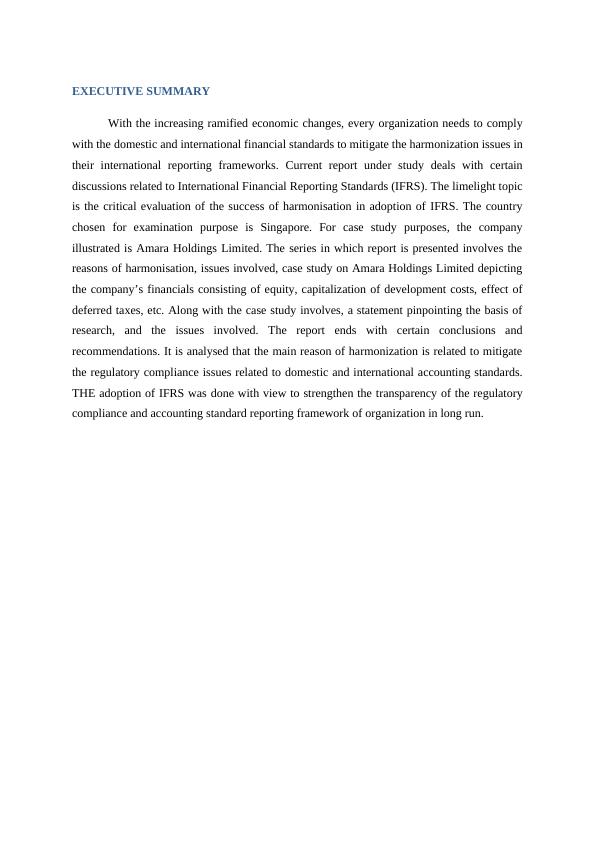
Table of Contents
EXECUTIVE SUMMARY...................................................................................................................1
INTRODUCTION.................................................................................................................................3
REASONS FOR HARMONISATION..................................................................................................3
ISSUES IN HARMONISATION..........................................................................................................5
CASE STUDY OF AMARA HOLDINGS LIMITED...........................................................................6
RECOMMENDATIONS.......................................................................................................................8
Conclusion...........................................................................................................................................10
COMMENT ON RESEARCH (Self Reflection).................................................................................10
REFERENCES....................................................................................................................................12
Appendix.............................................................................................................................................14
Appendix-2..........................................................................................................................................17
FROM THE ANNUAL REPORT OF FINANCIAL YEAR 2017......................................................................17
Balance sheet of 2017.........................................................................................................................18
Profit and loss for 2017.......................................................................................................................18
OUTSTANDING LEASE COMMITMENTS 2017......................................................................................19
OUTSTANDING LEASE 2016.................................................................................................................19
FINANCIAL INSTRUMENTS 2016 AND 2017.........................................................................................20
BALANCE SHEET 2016..........................................................................................................................20
EXECUTIVE SUMMARY...................................................................................................................1
INTRODUCTION.................................................................................................................................3
REASONS FOR HARMONISATION..................................................................................................3
ISSUES IN HARMONISATION..........................................................................................................5
CASE STUDY OF AMARA HOLDINGS LIMITED...........................................................................6
RECOMMENDATIONS.......................................................................................................................8
Conclusion...........................................................................................................................................10
COMMENT ON RESEARCH (Self Reflection).................................................................................10
REFERENCES....................................................................................................................................12
Appendix.............................................................................................................................................14
Appendix-2..........................................................................................................................................17
FROM THE ANNUAL REPORT OF FINANCIAL YEAR 2017......................................................................17
Balance sheet of 2017.........................................................................................................................18
Profit and loss for 2017.......................................................................................................................18
OUTSTANDING LEASE COMMITMENTS 2017......................................................................................19
OUTSTANDING LEASE 2016.................................................................................................................19
FINANCIAL INSTRUMENTS 2016 AND 2017.........................................................................................20
BALANCE SHEET 2016..........................................................................................................................20
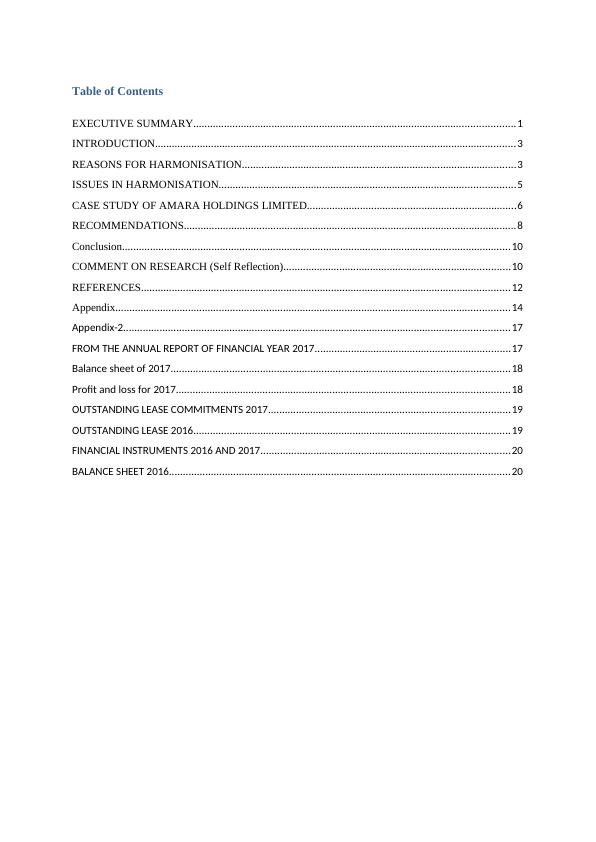
INTRODUCTION
IFRS is like a common communication tool for business affairs so that the accounts of
the companies on a global platform seem comparable and streamlined. These are the
accounting standards that are issues by International Accounting Standards Board (IASB)
(Larson & Herz, 2013). Harmonisation with IFRS stands as an effort to gradually bring a
reduction in the diversities involved in several accounting practices at the global level.
Further harmonisation with IFRS deals with removing the hindrances that obstruct purposeful
integration of IFRS with current financial system. But the process of harmonisation is not as
easy as the theory speaks about. The upcoming sections describe in detail the exact situation.
In Singapore, all companies that have their incorporation done in Singapore and the
Singapore branches of foreign companies are required to present their financial statements as
per Singapore Financial Reporting Standards (SFRS) as per the requirement of companies act
(Joshi, Yapa & Kraal, 2016). The substance of Singapore financial reporting standards is
same as International Financial Reporting Standards. It will not only strengthen the
disclosure and financial reporting standards process which will strengthen the disclosure
requirement of organization. However, after adopting the IFRS rules and regulations in
Singapore, the major changes in the accounting standards and applicable laws have been
found is related to contract laws, lease agreement and impairment test undertaken by the
companies.
REASONS FOR HARMONISATION
Before any particular reason can be established as a motivating factor behind
harmonisation, the most certain deal is the reduction of cross country diversities in
accounting practices. With the onset of globalisation, the whole world is working at the same
parlance with their own set of opportunities. However, at the international level the financial
reporting disparities probed a big issue. In order to mitigate the reporting and accounting
issues arise due to the domestic and international accounting standards, Singapore accepted
the parlances of the harmonization in its listed companies reporting. Researches have
suggested that the main reason behind the adoption of IFRS is getting larger access to
overseas and international capital markets (Garanina & Kormiltseva, 2014). It is so because,
with financial instruments prepared with the help of globally accepted accounting policies,
IFRS is like a common communication tool for business affairs so that the accounts of
the companies on a global platform seem comparable and streamlined. These are the
accounting standards that are issues by International Accounting Standards Board (IASB)
(Larson & Herz, 2013). Harmonisation with IFRS stands as an effort to gradually bring a
reduction in the diversities involved in several accounting practices at the global level.
Further harmonisation with IFRS deals with removing the hindrances that obstruct purposeful
integration of IFRS with current financial system. But the process of harmonisation is not as
easy as the theory speaks about. The upcoming sections describe in detail the exact situation.
In Singapore, all companies that have their incorporation done in Singapore and the
Singapore branches of foreign companies are required to present their financial statements as
per Singapore Financial Reporting Standards (SFRS) as per the requirement of companies act
(Joshi, Yapa & Kraal, 2016). The substance of Singapore financial reporting standards is
same as International Financial Reporting Standards. It will not only strengthen the
disclosure and financial reporting standards process which will strengthen the disclosure
requirement of organization. However, after adopting the IFRS rules and regulations in
Singapore, the major changes in the accounting standards and applicable laws have been
found is related to contract laws, lease agreement and impairment test undertaken by the
companies.
REASONS FOR HARMONISATION
Before any particular reason can be established as a motivating factor behind
harmonisation, the most certain deal is the reduction of cross country diversities in
accounting practices. With the onset of globalisation, the whole world is working at the same
parlance with their own set of opportunities. However, at the international level the financial
reporting disparities probed a big issue. In order to mitigate the reporting and accounting
issues arise due to the domestic and international accounting standards, Singapore accepted
the parlances of the harmonization in its listed companies reporting. Researches have
suggested that the main reason behind the adoption of IFRS is getting larger access to
overseas and international capital markets (Garanina & Kormiltseva, 2014). It is so because,
with financial instruments prepared with the help of globally accepted accounting policies,
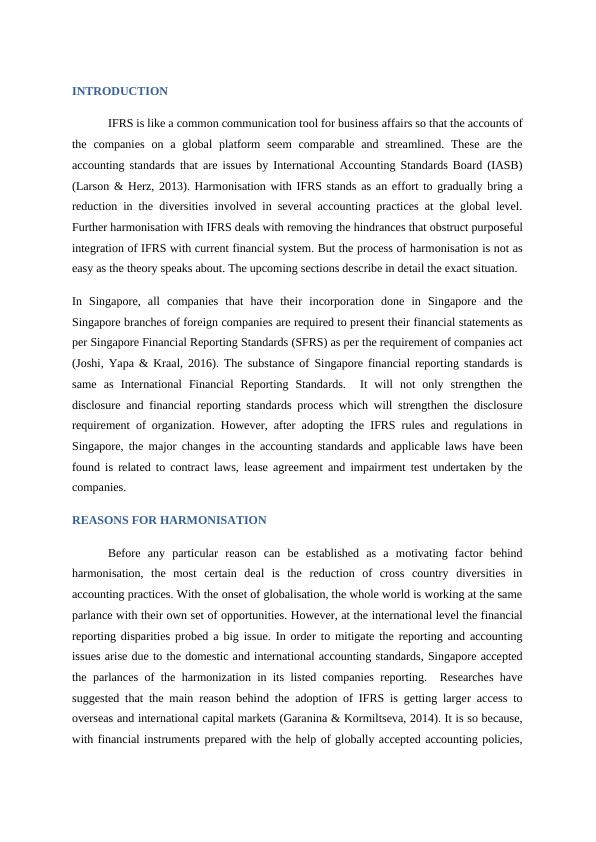
they become widely accepted (Biddle, Callahan, Hong & Knowles, 2016). This is in line with
increasing the capital investment made in country.
Along with the access which the Singapore will get much widely after adoption, the
adoption of IFRS ensures the investors that they are getting the best quality reports. The other
benefit which is a great driver when it comes to harmonisation is the reduction of
reconciliation costs because, now entities need not to converge with different countries’
accounting policies and prepare separate statements.
It is analyzed that if Singapore adopts the IFRS rules and regulations then it will result
to less reporting issues for the international companies which are working on international
level. It will also lead to cost benefits due to elimination of preparation of financial accounts
in accordance with different countries’ accounting policies, harmonisation brings into light
effective audit being conducted (Kusnadi, Leong, Suwardy & Wang, 2016) .
Singapore will strengthen its reporting requirement and transparent accounting busienss
practice if it adopts the IFRS rules and regulation in its economic. It will frame of policies in
preparation of accounts which makes it easier to audit them and at the same time gives results
that are internationally accepted. If company follow the IFRS rules and regulations then it
will avoid the unnecessary costing and charges of company in preparation of the financial
statement which will eventually make the business more cost effective. It is further analysed
that in case of conflict arise in the international financial reporting standards and domestic
reporting standards, company will comply with the IFRS rules and regulation. Singapore has
made mandatory for all the listed companies to comply with the IFRS rules and regulations as
it lower down the conflicts in domestic and international reporting frameworks and make
easy for the international companies to comply with the reporting compliance laws.
The process of harmonisation had been a well-planned and well-articulated process
for the country. The opinions of users across overseas as well as the organisations have been
considered before any finalisation. This had made IFRS much wide in scope and better than
any country’s individual accounting practice. Adoption of IFRS is being considered as the
‘best practice’ among almost countries of the world as it accrues certain benefits as reduction
in costs, wider access to overseas markets, standard benchmark for preparation of financial
instruments, better and highly efficient allocation of resources, decreased chances of resorting
to earnings management to manipulate accounts and etc.
increasing the capital investment made in country.
Along with the access which the Singapore will get much widely after adoption, the
adoption of IFRS ensures the investors that they are getting the best quality reports. The other
benefit which is a great driver when it comes to harmonisation is the reduction of
reconciliation costs because, now entities need not to converge with different countries’
accounting policies and prepare separate statements.
It is analyzed that if Singapore adopts the IFRS rules and regulations then it will result
to less reporting issues for the international companies which are working on international
level. It will also lead to cost benefits due to elimination of preparation of financial accounts
in accordance with different countries’ accounting policies, harmonisation brings into light
effective audit being conducted (Kusnadi, Leong, Suwardy & Wang, 2016) .
Singapore will strengthen its reporting requirement and transparent accounting busienss
practice if it adopts the IFRS rules and regulation in its economic. It will frame of policies in
preparation of accounts which makes it easier to audit them and at the same time gives results
that are internationally accepted. If company follow the IFRS rules and regulations then it
will avoid the unnecessary costing and charges of company in preparation of the financial
statement which will eventually make the business more cost effective. It is further analysed
that in case of conflict arise in the international financial reporting standards and domestic
reporting standards, company will comply with the IFRS rules and regulation. Singapore has
made mandatory for all the listed companies to comply with the IFRS rules and regulations as
it lower down the conflicts in domestic and international reporting frameworks and make
easy for the international companies to comply with the reporting compliance laws.
The process of harmonisation had been a well-planned and well-articulated process
for the country. The opinions of users across overseas as well as the organisations have been
considered before any finalisation. This had made IFRS much wide in scope and better than
any country’s individual accounting practice. Adoption of IFRS is being considered as the
‘best practice’ among almost countries of the world as it accrues certain benefits as reduction
in costs, wider access to overseas markets, standard benchmark for preparation of financial
instruments, better and highly efficient allocation of resources, decreased chances of resorting
to earnings management to manipulate accounts and etc.
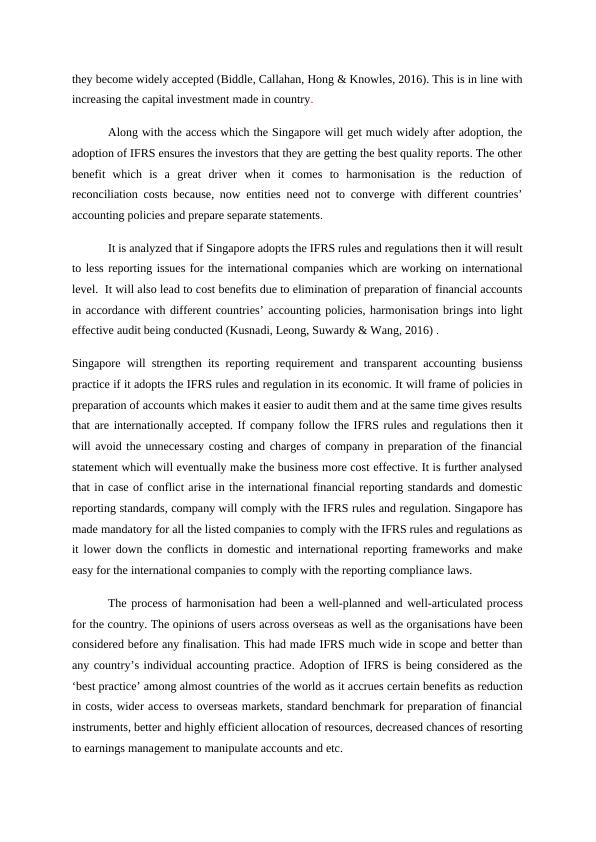
ISSUES IN HARMONISATION
As already discussed, implementation of IFRS doesn’t seem as easy as the text says.
IFRS involves a drastic change in the accounting policies that are being followed by an
entity. The key decision of adopting the IFRS is related to that demanded attention included,
retention of optional accounting treatments; retention of Singapore specific disclosures; the
extent of application of IFRS (Edogbanya, Adejoh & Kamardin, 2014). The various
challenges involved in the process of harmonisation are discussed as follows: These issues
and challenges have emerged due to the different regulatory compliance program and less
effective harmonization process which each and every company needs to adopt in their
reporting frameworks. The Harmonization process is promoted so that every company could
adopt the standard reporting frameworks on the international level so that it would be less
confusing for the stakeholder in the interpretation of the financial transactions reported in the
financial statement. However, there are some of the issues have been found in the
harmonization process of accounting standard (Christensen, Lee, & Walker, 2007).
Singapore faced the issues while adopting the IFRS by the rulling party in its economic but at
the same time it was opposed by the opposition party as they lead the case towards the
overriding domestic compliance program and may result to domination on the domestic
regulatory accounting reporting compliance. The main issues which Singapore faced in
adoption of the IFRS were related to changes in the several acts such as Corporation act,
listing requirements and accounting rules. It leaded to big level of complexity and issues for
the Singapore while adopting the harmonization in its financial reporting. The staffs of any
organisation are well trained to follow the existing policies. Any change or updating in the
structure needs the requirement of change management. The staffs are required to get
acquainted with the benefits that the new system shall bring to them and the organisation.
This may call for union movements across the country and shall cause a situation of tension.
Accountant and financial mangers needs to learn all the IFRS and domestic accounting
standards to mitigate the international financial reporting issues with the international
business growth.
The employees are required to be trained about the changed policies and the procedures that
they need to learn and follow. The training needs to be done with the help of training
consultants which also adds to the cost. Government may need to extend financial aid to the
organisations. Different countries have different scope of accounting work and hence the
As already discussed, implementation of IFRS doesn’t seem as easy as the text says.
IFRS involves a drastic change in the accounting policies that are being followed by an
entity. The key decision of adopting the IFRS is related to that demanded attention included,
retention of optional accounting treatments; retention of Singapore specific disclosures; the
extent of application of IFRS (Edogbanya, Adejoh & Kamardin, 2014). The various
challenges involved in the process of harmonisation are discussed as follows: These issues
and challenges have emerged due to the different regulatory compliance program and less
effective harmonization process which each and every company needs to adopt in their
reporting frameworks. The Harmonization process is promoted so that every company could
adopt the standard reporting frameworks on the international level so that it would be less
confusing for the stakeholder in the interpretation of the financial transactions reported in the
financial statement. However, there are some of the issues have been found in the
harmonization process of accounting standard (Christensen, Lee, & Walker, 2007).
Singapore faced the issues while adopting the IFRS by the rulling party in its economic but at
the same time it was opposed by the opposition party as they lead the case towards the
overriding domestic compliance program and may result to domination on the domestic
regulatory accounting reporting compliance. The main issues which Singapore faced in
adoption of the IFRS were related to changes in the several acts such as Corporation act,
listing requirements and accounting rules. It leaded to big level of complexity and issues for
the Singapore while adopting the harmonization in its financial reporting. The staffs of any
organisation are well trained to follow the existing policies. Any change or updating in the
structure needs the requirement of change management. The staffs are required to get
acquainted with the benefits that the new system shall bring to them and the organisation.
This may call for union movements across the country and shall cause a situation of tension.
Accountant and financial mangers needs to learn all the IFRS and domestic accounting
standards to mitigate the international financial reporting issues with the international
business growth.
The employees are required to be trained about the changed policies and the procedures that
they need to learn and follow. The training needs to be done with the help of training
consultants which also adds to the cost. Government may need to extend financial aid to the
organisations. Different countries have different scope of accounting work and hence the
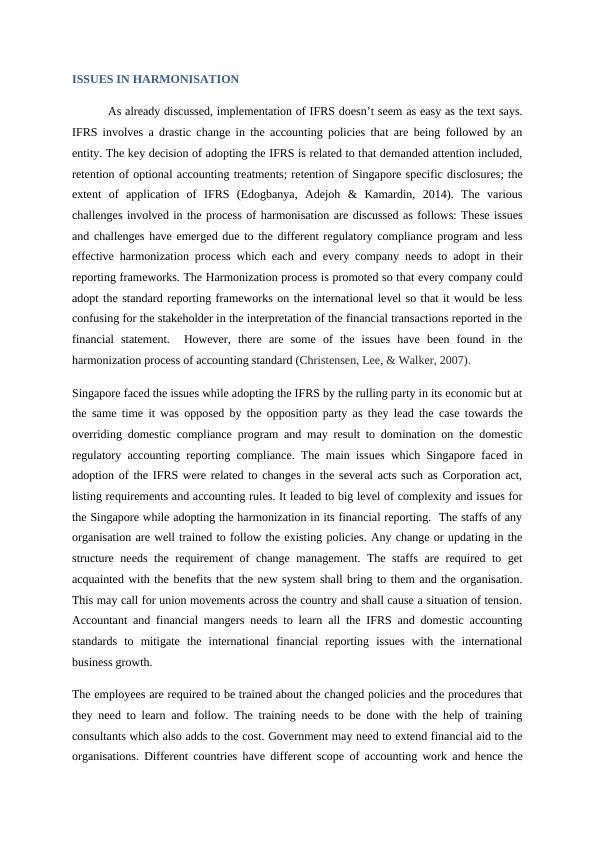
End of preview
Want to access all the pages? Upload your documents or become a member.
Related Documents
Harmonization Process Reportlg...
|14
|3324
|129
Accounting Theory and Applicationlg...
|11
|3683
|62
The Success of Harmonization in Singapore Presentation 2022lg...
|8
|340
|9
South Korean Accounting Policies and IFRS Evaluationlg...
|16
|3605
|245
Advance Financial Accounting: Reportlg...
|18
|4129
|43
The Success of Harmonization in Singapore Research Paper 2022lg...
|15
|3471
|11
